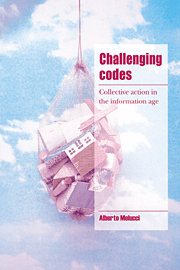Introduction
Published online by Cambridge University Press: 23 November 2009
Summary
Prophet: the one who speaks before
Movements in complex societies are disenchanted prophets. The charmed universe of the heroes has definitively dissolved under the impact of an era taking cognizance of itself as a planetary system riven by molecular change, as a system which constantly generates tensions and then in turn adapts to them by striving to control them. Movements are a sign; they are not merely an outcome of the crisis, the last throes of a passing society. They signal a deep transformation in the logic and the processes that guide complex societies.
Like the prophets, the movements ‘speak before’: they announce what is taking shape even before its direction and content has become clear. The inertia of the old categories may prevent us from hearing the message and from deciding, consciously and responsibly, what action to take in light of it. Without the capacity of listening to these voices, new forms of power may thus coalesce, though multiple and diffuse and no longer reducible to any linear and easily recognizable geometry.
Contemporary movements are prophets of the present. What they possess is not the force of the apparatus but the power of the word. They announce the commencement of change; not, however, a change in the distant future but one that is already a presence. They force the power out into the open and give it a shape and a face.
- Type
- Chapter
- Information
- Challenging CodesCollective Action in the Information Age, pp. 1 - 10Publisher: Cambridge University PressPrint publication year: 1996
- 1
- Cited by

